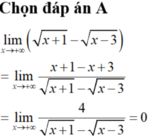Tính lim x → + ∞ x + 1 - x - 3
A. 0
B. 2
C. - ∞
D. + ∞
Hãy nhập câu hỏi của bạn vào đây, nếu là tài khoản VIP, bạn sẽ được ưu tiên trả lời.



a. \(lim_{x\rightarrow3}\dfrac{x^3-27}{3x^2-5x-2}=\dfrac{3^3-27}{3.3^2-5.3-2}=\dfrac{0}{10}=0\)
b. \(lim_{x\rightarrow2}\dfrac{\sqrt{x+2}-2}{4x^2-3x-2}=\dfrac{\sqrt{2+2}-2}{4.2^2-3.2-2}=\dfrac{0}{8}=0\)
c. \(lim_{x\rightarrow1}\dfrac{1-x^2}{x^2-5x+4}=lim_{x\rightarrow1}\dfrac{\left(1-x\right)\left(x+1\right)}{\left(x-1\right)\left(x-4\right)}=lim_{x\rightarrow1}\dfrac{-\left(x+1\right)}{x-4}=\dfrac{-\left(1+1\right)}{1-4}=\dfrac{2}{3}\)
d. Câu này mình chịu, nhìn đề hơi lạ so với bình thường hehe

Bạn tự hiểu là giới hạn tiến đến đâu nhé, làm biếng gõ đủ công thức
a. \(\frac{\sqrt{1+x}-1+1-\sqrt[3]{1+x}}{x}=\frac{\frac{x}{\sqrt{1+x}+1}-\frac{x}{1+\sqrt[3]{1+x}+\sqrt[3]{\left(1+x\right)^2}}}{x}=\frac{1}{\sqrt{1+x}+1}-\frac{1}{1+\sqrt[3]{1+x}+\sqrt[3]{\left(1+x\right)^2}}=\frac{1}{2}-\frac{1}{3}=\frac{1}{6}\)
b.
\(\frac{1-x^3-1+x}{\left(1-x\right)^2\left(1+x+x^2\right)}=\frac{x\left(1-x\right)\left(1+x\right)}{\left(1-x\right)^2\left(1+x+x^2\right)}=\frac{x\left(1+x\right)}{\left(1-x\right)\left(1+x+x^2\right)}=\frac{2}{0}=\infty\)
c.
\(=\frac{-2}{\sqrt[3]{\left(2x-1\right)^2}+\sqrt[3]{\left(2x+1\right)^2}+\sqrt[3]{\left(2x-1\right)\left(2x+1\right)}}=\frac{-2}{\infty}=0\)
d.
\(=x\sqrt[3]{3-\frac{1}{x^3}}-x\sqrt{1+\frac{2}{x^2}}=x\left(\sqrt[3]{3-\frac{1}{x^3}}-\sqrt{1+\frac{2}{x^2}}\right)=-\infty\)
e.
\(=\frac{2x^2-8x+8}{\left(x-1\right)\left(x-2\right)\left(x-2\right)\left(x-3\right)}=\frac{2\left(x-2\right)^2}{\left(x-1\right)\left(x-3\right)\left(x-2\right)^2}=\frac{2}{\left(x-1\right)\left(x-3\right)}=\frac{2}{-1}=-2\)
f.
\(=\frac{2x}{x\sqrt{4+x}}=\frac{2}{\sqrt{4+x}}=1\)

Đề bị lỗi công thức rồi bạn. Bạn cần viết lại để được hỗ trợ tốt hơn.

\(\mathop {\lim }\limits_{x \to 3} \frac{{{x^2} - 9}}{{x - 3}} = \mathop {\lim }\limits_{x \to 3} \frac{{\left( {x - 3} \right)\left( {x + 3} \right)}}{{x - 3}} = \mathop {\lim }\limits_{x \to 3} \left( {x + 3} \right) = 3 + 3 = 6\)
Chọn B.

\(=\lim\limits_{x\rightarrow0}\dfrac{2\left(\sqrt[]{2x+1}-1\right)+2-\sqrt[3]{x^2+x+8}}{x}\)
\(=\lim\limits_{x\rightarrow0}\dfrac{\dfrac{2.2x}{\sqrt[]{2x+1}+1}-\dfrac{x\left(x+1\right)}{\sqrt[3]{\left(x^2+x+8\right)^2}+2\sqrt[3]{x^2+x+8}+4}}{x}\)
\(=\lim\limits_{x\rightarrow0}\left(\dfrac{4}{\sqrt[]{2x+1}+1}-\dfrac{x+1}{\sqrt[3]{\left(x^2+x+8\right)^2}+2\sqrt[3]{x^2+x+8}+4}\right)\)
\(=\dfrac{23}{12}\)

\(\mathop {\lim }\limits_{x \to + \infty } \frac{{2{\rm{x}} - 1}}{x} = \mathop {\lim }\limits_{x \to + \infty } \frac{{x\left( {2 - \frac{1}{x}} \right)}}{x} = \mathop {\lim }\limits_{x \to + \infty } \left( {2 - \frac{1}{x}} \right) = 2 - 0 = 2\)
Chọn A.